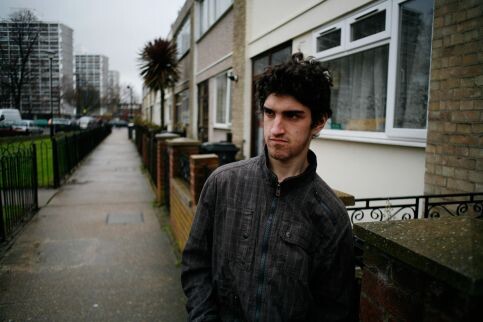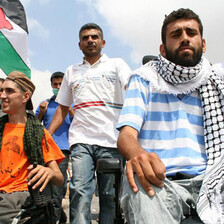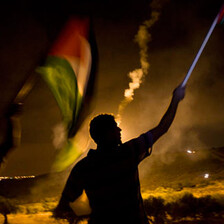The Electronic Intifada 17 December 2010
Over the past month, journalist and activist Jody McIntyre has joined a growing number of students, workers, activists and others in the United Kingdom in protesting a government decision to cut public sector funding, especially in the field of education. Last week, as tens of thousands of students took to the streets of central London, parliament voted in favor of a plan that will raise tuition fees by 300 percent.
Jody, who spent months alongside Palestinians in the West Bank and Gaza Strip protesting the Israeli occupation, has been a frequent contributor to The Electronic Intifada. Now back in London, Jody has been attending and reporting on the various student-led protests and other actions against the government’s spending cuts. EI’s Matthew Cassel spoke with Jody at his south London home.
Matthew Cassel: I’d like to start by asking you: what’s happening in this country right now?
Jody McIntyre: Well, what’s happening is that we now have a coalition government that we like to refer to as the “Con-Dem” [the ruling coalition government consisting of the Conservative and Liberal Democrat parties] government who care about no one but themselves and the elites that are keeping them in power. We now have a government cabinet with 16 millionaires in it, so clearly they are very far removed from our society. The first target of the axe that the government is wielding has been education; they want to increase tuition fees by 300 percent when they all got an education at university not for 3,000 pounds [$4,700, the annual maximum fee before the increase], but for free, every single one of them. They also want to cut EMA [Education Maintenance Allowance], a weekly allowance for 16- to 18-year-old students from poor backgrounds. They also want to slash university education funding. As a response to that we have seen huge demonstrations of tens of thousands of students in London and across the country. In the first demonstration [on 10 November], the Conservative Party headquarters in London was occupied by students. And these demonstrations are not getting smaller, they are growing and students are standing up and refusing to have their futures decimated by this government.
MC: You yourself, you’re not a student, right?
JM: I’m not a student myself, but …
MC: So, why are you protesting?
JM: But there are two main reasons why I’m joining the demonstrations against this. One, is that although I’m not a student myself, people like my younger brother, who is 16 years old, are in the generation that will be directly affected by these cuts. He will want to attend university in the next couple of years and thanks to these new laws being forced through by the government he will not be able to afford a university education. I feel that acceptance into university should be based on the merit of your grades not on the size of your wallet, and this is what we are fighting for. Equality, not inequality. Not a two-tier education system whereby only the rich can afford a university education. The second point is that education is only the first target for this government. For example, as a disabled person, I receive an amount of disability living allowance; the government have now announced that they will review every case of disability living allowance next year. So instead of focusing on the multinational corporations, such as Vodafone, who have an unpaid tax bill of six billion pounds [$9.4 billion], they are targeting the poorest and the most vulnerable sections of society and that will not be limited to students, that will affect us all. So we need to, from day one, all be united in resisting against the government.
MC: You’ve been making headlines in British media over the past week after you were dragged from your wheelchair not once, but twice, during the demonstration last Thursday. Can you tell us what happened exactly?
JM: During that demonstration [on 9 December], which is the fourth demonstration over the last few weeks to happen over these education reforms, I was attacked twice by the police. The first time, towards the beginning of the demonstration, I was sitting in my wheelchair at the front of the crowd with riot police in front of me and mounted police on horses behind them. One police office struck me on my shoulder with a baton, injuring my shoulder; four police officers then dragged me from my wheelchair and carried me down the road. Around 45 minutes later there was the second incident over at the other side of Parliament Square [where the majority of the protests happened]. I was sitting in my wheelchair in the middle of the road, a significant distance away from the crowd, when one of the police officers who recognized me from the first incident came running over, tipped me out of my wheelchair onto the road and then dragged me across the road by my arms.
MC: Now you’re going to file a case against the officers who did this, right?
JM: Yes, I’m in discussion with my lawyer and all options are being considered, but an official complaint has been filed.
MC: This isn’t the first time you’ve been beaten or dragged from your wheelchair during a protest, is that right?
JM: Well after living in Palestine for nine months and attending nonviolent demonstrations there and being attacked on a weekly, not on a one-off basis, but on a weekly basis by Israeli occupation forces attacking myself, Palestinians in wheelchairs, and other friends in wheelchairs — not with their hands and with batons, but with sound grenades and tear gas and rubber-coated steel bullets and live ammunition that is really a threat to my life, not just in terms of humiliation, but an actual threat. So for me, the threat of a police officer [in London] is really quite minor compared to that. So I think that the opposition here really need to step up their game if they think they’re going to silence me that easily.
MC: Where was that in Palestine, exactly?
JM: Well I spent the first month of my time living with the Hanoun family in the East Jerusalem neighborhood of Sheikh Jarrah. During the time I was living with them they were evicted from their home to make way for American and British settlers. People not with Middle Eastern heritage, but with New York accents, and London accents, and British and American passports traveling thousands of miles across the world to steal someone else’s home. And on that occasion, at around 5:00 in the morning, I was dragged out of the house and thrown down concrete steps by Israeli armed forces. And I spent the next few weeks sleeping on the pavement with the Hanoun family opposite their home.
I was then living in Bilin, a village in the West Bank, for six months, which became my home and the people there became my family. Every night the Israeli army would invade the village and arrest friends of mine, people I would hang out with and talk to all day. Teenagers, children were dragged from their beds at night and put in prison for months on end without their families being told where they were being taken, purely for the reason that they chose to resist against their oppressor and they chose to attend the weekly demonstrations at Israel’s apartheid wall which has stolen over half of their land. After living in Bilin for six months, I traveled to Gaza, to the Gaza Strip, to Gaza City and Beit Hanoun in the north, and there were also nonviolent demonstrations where they would march into the 300-meter “buffer zone” that the Israeli army had illegally imposed as a collective punishment measure on the people of the Gaza Strip. But the only difference between Gaza and Bilin is that in Bilin the Israeli soldiers would use a wider range of weapons whereas in Gaza only live ammunition was used.
MC: Obviously the situations are very different in London, England when compared to what’s happening in occupied Palestine, but as someone who has witnessed popular, grassroots and unarmed demonstrations and protest movements, are there some similarities that you can draw between the two or any connections?
JM: I think the similarity here is the question of equality and inequality, this is the root of all conflicts we are now seeing. We are fighting for equality, for all people, irrespective of race, religion, gender, wealth, or physical ability. In Palestine, the only way an Israeli soldier can morally justify how he’s treating Palestinians on a daily basis is by holding the belief that Palestinian people are inferior to Western people, in the same way here, the only way our government can justify what they are doing is by holding the ideology that people with less money are inferior to those people with more money. This is the root cause. We want equality for all people, they want inequality.

Jody McIntyre outside his home in south London (Matthew Cassel)
MC: There is now a famous interview with you on the BBC going around the web, apparently it was the most watched YouTube video anywhere in the world on Wednesday. In that video you challenged the interviewer when he suggested that police violence against you and other protestors was somehow justified. Before the interviewer cut you off, you started to compare this “blame the victim” tactic the British media are using now with the protestors and how its a tactic that was used during events in Palestine. Would you mind continuing that point you were trying to make before you were cut off? I’m not going to cut you off, so don’t worry, you can speak freely.
JM: Great, it’s nice not to be cut off in an interview. The way I was going to expand on that point is quite simply to say, as with the Palestinian conflict, the BBC tried to portray the apartheid state of Israel, who are the oppressor and the perpetrator of violence, as the victim of violence, and the Palestinians, who are the oppressed people, in this conflict, as the perpetrator of violence. This is what they are now trying to do with the student demonstrators, to such an extent that they are prepared for eight minutes live on national television to try and suggest that a person with cerebral palsy in a wheelchair brought on himself assault from a member of the Metropolitan Police. They have this time gone so far down the road of insanity that I don’t think they have a shred of credibility left as a news broadcaster. But I think the point that I’m also trying to make is that this should not be a surprise to us. That interviewer’s line of questioning I don’t think should be a shock to anyone, that is standard BBC tactics. They are the state media in this country. Why are we so easy to condemn state media in other countries but somehow expect to describe our own state media as impartial. It’s so hypocritical that it makes me feel sick.
And again, the root of this is the ideology of inequality that the ideology of Western supremacy, of superiority, the ideology that our state media must be unbiased and fair, but the state media of other nations must be unfair and biased. Whereas in reality, all state media is biased, it is a media of the government, it is the media of the state, so obviously in the BBC’s reporting of all issues, from Palestine, to Iraq, to Afghanistan to now with the student demonstrations on a domestic level, of course the BBC’s reporting will be pro-government. They are the government’s media wing, that’s what the BBC represents. Just as the police represent the government’s armed wing and the army represent the armed wing, the BBC are the government’s PR campaign, the government’s media wing.
MC: In their coverage of Palestine, if there are popular demonstrations in the West Bank, or during Israel’s assault on Gaza in 2008/2009, did their coverage of those kind of events reflect this “blame the victim” tactic?
JM: Yeah, it’s simply this “blame the victim” tactic, and not only that, but to flip the situation so that the perpetrator of the violence, the perpetrator of the crime, is the victim, and the victim is the perpetrator. So in the context of Palestinian conflict, this means that Palestinians resisting against the occupation of their country are terrorists, and Israelis who are occupying another person’s country are victims. And it’s a very strange line of argument. But, it’s an imperialist argument, it’s a colonialist argument: Israelis, as Western people, deserve that land. This is not new. Britain, and now America, have been colonizing other people’s countries for centuries. Israel and Zionism are a symptom of imperialism and colonialism, ideologies of inequality. Israel is not the first example of this, or the cause, or the root, it is a symptom, just as we have colonized countries across the world, Israel is a colonialist state.
MC: So back here in London, other than bringing a case against the police officers who mistreated you, can we expect you to continue taking part in these demonstrations and reporting on them? What do you have planned?
JM: Of course. The police, and the government, and the media, will never cower me into silence and will never bully me into inaction. These demonstrations will continue, we will continue to come out into the streets in our thousands and the police know they can’t control us to such an extent that you now have former police commissioners coming onto national television and suggesting that people should be arrested before they have attended a demonstration.
MC: Sounds a bit like Egypt or Iran.
JM: Well, it’s now got to the point, that if we hadn’t already, we have now finally crossed that line into a completely Orwellian society. But that’s a good point you make. This statement says, from a former police commissioner, that we should arrest people intending on attending anti-government demonstrations. Let’s imagine for one second that that statement was made in Egypt or in Iran, or in any Muslim country, any Arab country, any Latin American country, any African country, any Asian country — this would be denounced as a dictatorship. But when it’s announced here it’s normal. This is a hypocrisy that runs through every line of the corporate media’s reporting, from the BBC to Sky, to FOX and CNN in America, and often it is the more supposedly “center” media that are more dangerous than the far right media. Because the far right are so easy to brush off because of their stupidity in their reporting, whereas the BBC are far more, well, now they’re going that way as well, but they try to be more subtle and veil their reporting in impartiality, but I think that the veil has been removed a long time ago and if it wasn’t a long time ago, it certainly has been removed now.
Matthew Cassel is an independent journalist and photographer based in the Middle East.





